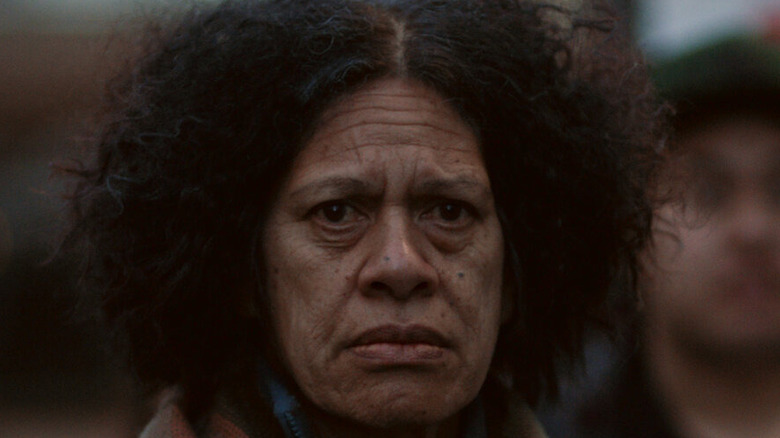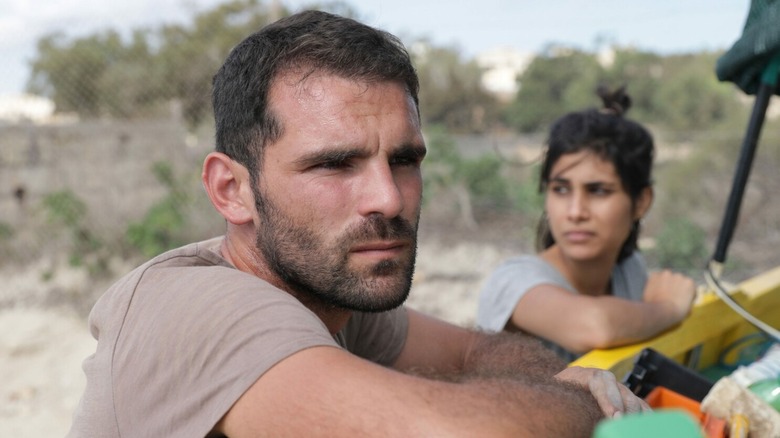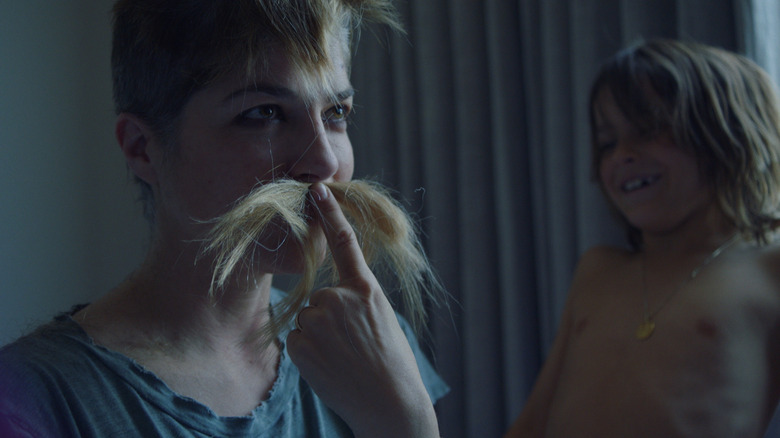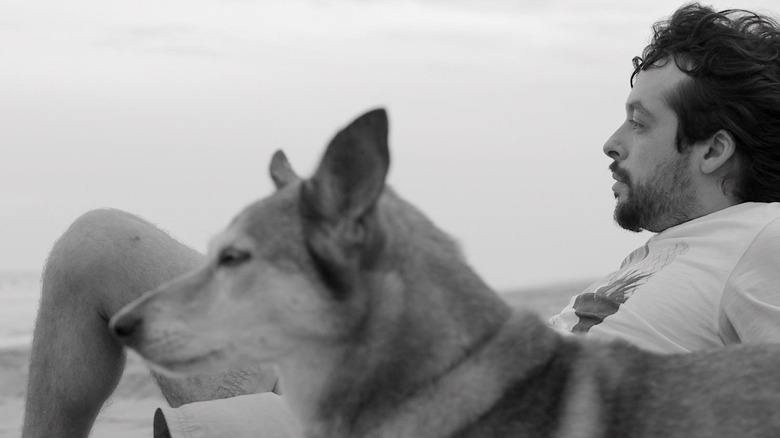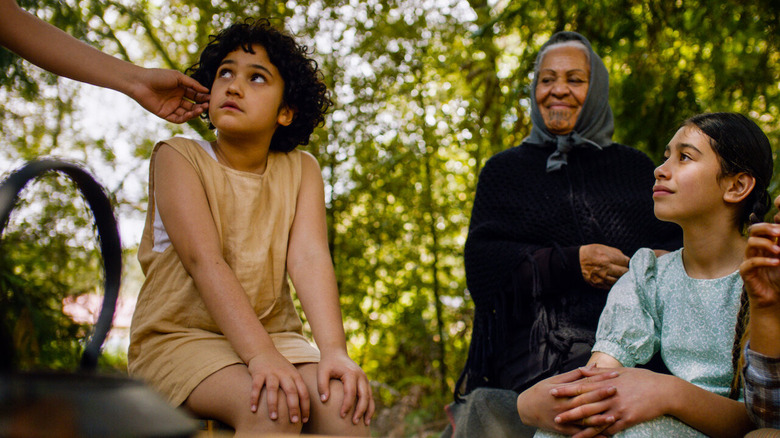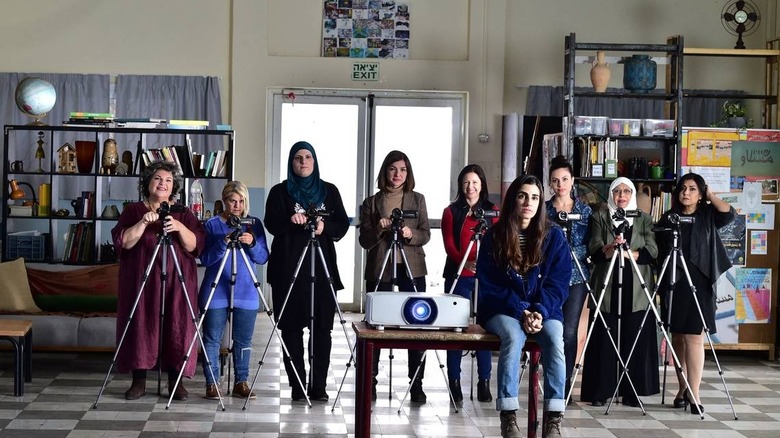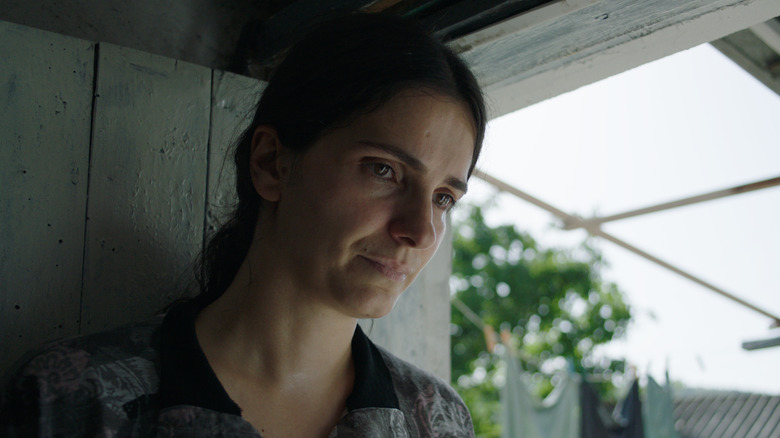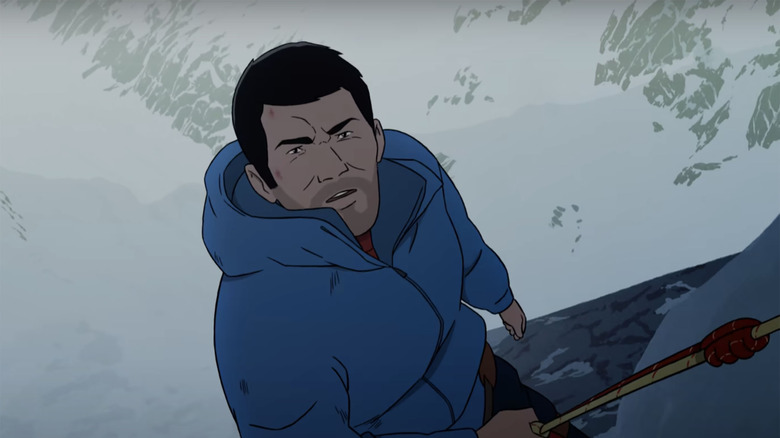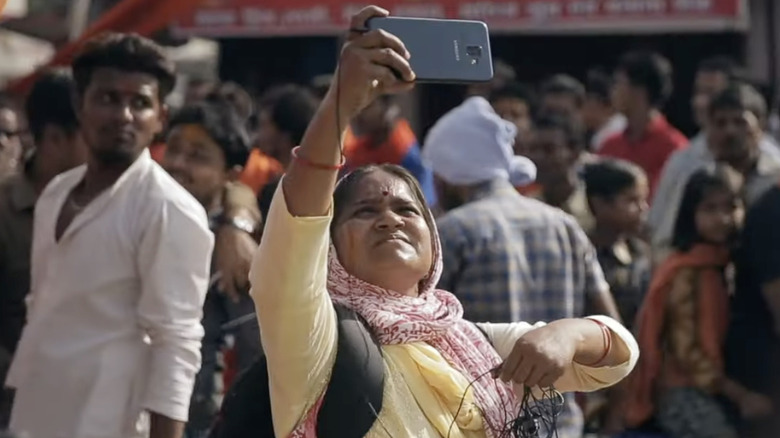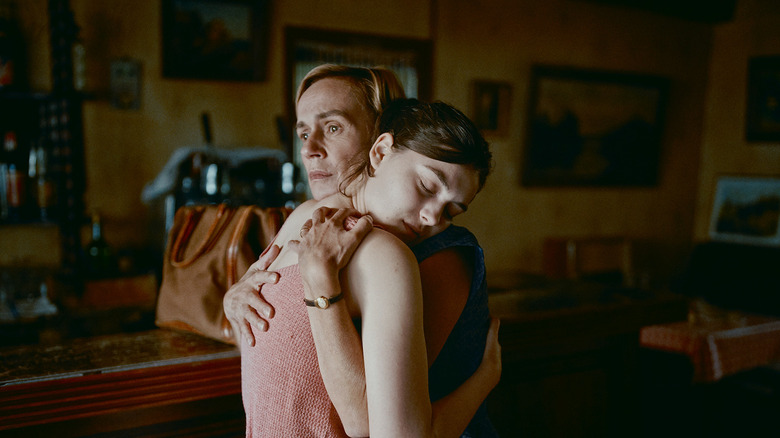These Are The Only Movies With Perfect Rotten Tomatoes Scores In 2021
With 2021 now firmly in the rearview mirror, it's easier than ever to appreciate just how many quality films were released that year. Although 2021 wasn't devoid of mediocre or even downright terrible titles, there was also a swarm of challenging and thought-provoking motion pictures released around the world. The cream of 2021's cinema crop, though, is a small number of titles that managed to crack a perfect 100% rating on Rotten Tomatoes.
Per the opinions collected by this review aggregate site, these were the features that garnered exclusively positive marks from critics. Although not all of these films were declared flawless masterpieces, they all received universal praise thanks to the big creative swings they took. Such acclaim is especially important for these projects, since many of them are smaller-scale indie productions that need critical adoration to help stand out in a crowded marketplace.
This handful of movies that scored 100% on Rotten Tomatoes in 2021 range from a quiet meditation on being torn between tradition and modern economic realities to a gorgeously filmed depiction of enduring sisterly bonds to a harrowing rescue mission captured in real life. The sheer variety of stories and filmmaking techniques among these projects not only makes it clear why these individual movies scored the recognition that they did, but also reinforces what a great year 2021 was for feature-length storytelling.
Luzzu
Life is full of impossible choices, but one of the most difficult can be choosing between tradition and the modern (or the old world and new). In the case of "Luzzu," this conflict manifests in the life of Jesmark, a Maltese fisherman. He barely breaks even with his job, and he needs to take care of his wife and kid. Desperate for a solution, he considers forsaking his family legacy to work for local black market seafood dealers, who spread chaos wherever they go. Writer/director Alex Camilleri's debut "Luzzu" (named after a traditional Maltese fishing boat) captures a human being at an existential crossroads, and comments on how inescapable economic realities can mold us into the people we are.
Such weighty material helped this movie score positive marks across the board. Valerie Complex of Deadline Hollywood was impressed by the way that Camilleri takes the time to recognize the tiniest details of the Maltese fishing trade. In her eyes, having parts of "Luzzu" center around these rituals and techniques reflects the empathetic gaze of the entire feature. Carlos Aguilar of The Los Angeles Times, meanwhile, praised the film for taking a familiar narrative mold and injecting it with a perspective that's regularly ignored in other movies. We can't escape the impossible choices that define so much of our lives, but thankfully, there are films as good as "Luzzu" to help us navigate the thorny terrain of existence.
Introducing, Selma Blair
Audiences may think they know Selma Blair, thanks to her work in movies ranging from "Hellboy" to "Legally Blonde." But Rachel Fleit's unflinching documentary "Introducing, Selma Blair" will reshape anyone's prior perceptions of this actress. In part, this is thanks to the way the film captures the everyday life of Blair in the wake of her 2018 diagnosis of multiple sclerosis. Rather than just depicting Blair as someone dealing with hardships and traumas, "Introducing, Selma Blair" instead renders her life in a nuanced fashion. It's one full of struggles, sure, but it's also marked by the spitfire personality of Blair, as well as by her tender relationship with her son.
These complexities of "Introducing Selma Blair" turned this into one of the best-reviewed documentaries of 2021. The film's representation of the different layers of Blair were at the heart of Amy Amatangelo's glowing review for Paste Magazine, which also praised the interview segments with Blair as a highlight of the feature. Tara Bennett of IGN Movies expressed appreciation for Blair's "staggeringly funny" sense of humor, as well as for the filmmaking techniques that director Rachel Fleit employs in her feature documentary debut. Even with the variety of well-received movies she's been in, Selma Blair has never been in an acclaimed film quite like "Introducing, Selma Blair."
Paper Spiders
We all need to be taken care of. Even parents, who are expected to do the majority of caretaking, need help getting through the day. This is especially the case when they're grappling with mental health issues, which is the story at the heart of "Paper Spiders." The film focuses on Dawn (Lili Taylor), a mother, who is struggling with increasing anxiety and paranoid delusions. These problems become exacerbated when her daughter, Melanie (Stefania Owen), prepares to leave the house to go to college. It's a heartbreaking tale and one that could have lapsed into relentless schmaltz in the wrong hands. Thankfully, this wasn't the case with director and co-writer Inon Shampanier, whose sensitive approach and personal experience turned "Paper Spiders" into a hit with critics.
Part of what made "Paper Spiders" resonate with critics is the way it departs from typical norms of cinematic portrayals of mental health issues by embracing authenticity over sensationalism. Katie Walsh of The Los Angeles Times, for example, praised the messy but realistic depiction of living with someone with a mental health condition. Sheri Linden of The Hollywood Reporter also expressed fondness for the "nuanced" approach to the film's central mother/daughter dynamic. These qualities shaped this feature that left many critics dabbing their eyes and clutching their hearts.
The Dog Who Wouldn't be Quiet
While its title may sound like something in the vein of "Air Bud," "The Dog Who Wouldn't Be Quiet" is a bit more unique. "The Dog Who Wouldn't Be Quiet" follows the life of 30-something Sebastián (Daniel Katz) and his various jobs. Initially, his problems are mundane, as he struggles to secure employment because he can't leave his dog at home alone. As the film progresses, things get more and more absurd, especially once a meteor collides with the planet Earth, forever altering this world and causing even more chaos in the life of Sebastián.
Argentinian writer and director Ana Katz goes in every possible direction you can imagine in "The Dog Who Wouldn't Be Quiet," as she tells Sebastián's story in fragmented segments that make up the film's brief 73-minute runtime. That audacious spirit proved to be key to the film's positive critical reception. Peter Bradshaw of The Guardian aptly summarized what drew so many to this film, noting that Katz has delivered an "intriguing and beguiling" feature that seems so simply made, yet suggests so much artistry. Jessica Kiang of Variety was impressed with how well "The Dog Who Wouldn't Be Quiet" captures the strange relationship many people have had with time during the pandemic. All in all, "The Dog Who Wouldn't Be Quiet" scored far more acclaim than if it had been the "Air Bud" knock-off its title suggests.
Cousins
With the movie "Cousins," directors Ainsley Gardiner and Briar Grace-Smith (who also stars in one of the film's three lead roles) deliver a movie that's simultaneously emotionally brutal and touching. Based on Patricia Grace's 1992 novel of the same name, "Cousins" follows a trio of Maori cousins, who form a deep bond in childhood. Their close ties are painfully broken when one of them is sent to live in an orphanage to "assimilate" into society. Though they now live largely disparate lives separated by countless miles and obstacles, the adult versions of these three characters remain connected, as they have never actually given up on one another.
This powerful bond is the backbone of this critically-acclaimed New Zealand feature, which also centers on the historical reality of indigenous children being ripped away from their homes and cultures just so they can fit a racist definition of "normal" in the eyes of white society. Fionnuala Halligan of Screen International was especially taken with how this "moving and proudly matriarchal" film preserves the perspective of Maori individuals. Not only does this show respect to this oft-marginalized culture, but Halligan pointed out that it lends a distinct sense of identity to the entire motion picture. Meanwhile, Devika Girish of The New York Times praised the central performers, who portray the three protagonists during various points in their lives. Girish was especially impressed by the ways each actor brings personality, depth, and an "ache" or longing to these characters.
Sabaya
One might not think that a documentary would be the best form for a high-stakes rescue mission drama. Save for titles like "The Rescue," this is territory usually reserved for narrative features. But that's just what Hogir Hirori's "Sabaya" does, as it chronicles an attempt to rescue Yazidi women, who have been abducted by ISIS and held captive in a refugee camp known as Al-Hol (or Al-Hawl). It's a dangerous mission, whose horrors are exacerbated by the knowledge that we're not watching "Homeland" or a Peter Berg movie, but reality itself.
Understandably, reviews of "Sabaya" emphasized that this is a brutal, difficult film to watch and not one for the faint of heart. At the same time, critics also highlighted the sharp filmmaking and absorbing atmosphere of "Sabaya." Wendy Ide of Screen International noted the remarkable ways that the crew and subjects of "Sabaya" managed to conceal cameras to capture footage of incredibly hostile environments. She also observed that the film's "subtle and unobtrusive approach" to representing the women involved with this rescue mission has the added benefit of giving these figures "respect which has long been absent from their lives." It's just one of many outstanding qualities of "Sabaya," a rescue film like no other.
If you or anyone you know has been a victim of sexual assault, help is available. Visit the Rape, Abuse & Incest National Network website or contact RAINN's National Helpline at 1-800-656-HOPE (4673).
Hive
If you thought "The Wicker Man" and "Bee Movie" were the only notable motion pictures to involve bees, it's time you met the 2021 Albanian-language feature "Hive." Based on a true story, this movie tells the story of a group of widows in Kosovo, who decide to scrape together desperately needed funds by selling honey and condiments. As is often the case when women try to establish autonomy in a society that expects or demands otherwise, not everyone in their community is happy about this new business venture. A conflict ensues, which explores the systemic forces that keep people trapped and unable to express or explore themselves fully.
This thoughtful and highly relevant tale from director Blerta Basholli was a universally praised movie, which was especially commended for its restraint. This quiet film isn't afraid to eschew dialogue and quick cuts to convey the interior world of the on-screen characters more vividly. These subdued yet powerful filmmaking choices were enough to score recommendations from outlets like The New York Times. Tomris Laffley of RogerEbert.com acknowledged that although "Hive" doesn't "break new ground," the film is still necessary viewing, as it shows women enduring in the face of insurmountable odds. These kinds of opinions made "Hive" one of the most acclaimed limited release titles of 2021, all without even a single frame of Nicolas Cage getting stung by bees.
The Summit of the Gods
While mainstream family-friendly titles like "Encanto" and "The Mitchells vs. the Machines" got the brunt of the love for animated cinema in 2021, there were other adult-oriented titles in the indie sphere also making waves. Among those features was "The Summit of the Gods," a French title from director Patrick Imbert, based on Jirô Taniguchi's manga series (which was itself adapted from a novel by Baku Yumemakura). The movie follows the story of photojournalist Fakamachi, whose discovery of an important camera sends him down a rabbit hole, where he encounters ambitious mountaineers and the titular location.
David Ehlrich of IndieWire praised "The Summit of the Gods" for showing just what animation can do that live-action cinema can't, as it captures "ecstatically true vistas" in high-altitude locations that illustrate the visual beauty and capacities of this art form. Critics far and wide echoed Ehlrich's positive sentiments of "The Summit of the Gods," which extended beyond its beautiful hand-drawn animation. Tasha Robinson of Polygon also praised Imbert's thoughtful depiction of mountaineering ambitions as something that often resemble "madness" more than anything else. These unique qualities have ensured that "The Summit of the Gods" stands out in the crowded landscape of animated cinema released in 2021.
This is Not a War Story
Even once a war finishes in the physical sense, it never really ends for those who participated in it. How can a soldier ever escape the psychological scars of being on a battlefield or in a situation where human lives are at stake? "This Is Not a War Story" is a fictitious drama that focuses on several veterans (including a protagonist played by writer and director Talia Lugacy), who channel their frustrations and experiences into art. This process doesn't just allow them to create memorable works of visual expression, but also helps these veterans develop friendships and bonds, which remind them that they're not alone in their trauma and PTSD.
This artistic exploration serves as the bedrock for a movie that critics championed as being remarkable and insightful. Caroline Madden of Video Librarian hailed it as "one of the most honest post-war films" that "realistically" chronicles the countless ways veterans struggle to return to civilian life. Although Peter Sobczynski of RogertEbert.com noted that documentary-esque sequences were more "spellbinding and heartbreaking" than those adhering to a more traditional style of narrative drama, he was generally enthusiastic about the feature. In particular, he praised the casting of real-life veterans, which lends extra authenticity to the film. The movie's gripping realism was a core reason why "This is Not a War Story" became such an acclaimed entry in the canon of movies about the experiences of soldiers.
Writing with Fire
The newspaper Khabar Lahariya is one of the most important publications in India, and is the centerpiece of the documentary "Writing with Fire." Khabar Lahariya is the only newspaper in India that's run by women from the Dalit Caste, which is the lowest caste in Indian society. The journalists and others behind the newspaper face countless obstacles, as they pursue important stories about corruption and the plights of other marginalized people. However, the decision by directors Sushmit Ghosh and Rintu Thomas to chronicle these journalists, as they bring their newspaper into the digital age, highlights the enduring strength and commitment of these women.
The newspaper is not shown changing the world with one article, but rather, its continued existence is a direct rebuke to the societal expectations that a publication like Khabar Lahariya shouldn't even exist in the first place. "Writing with Fire" explores this idea to such a touching effect that critics praised it as an irresistible ode to unlikely everyday heroes. Kate Erbland of IndieWire commended the film for the way it "put[s] the audience very much inside the world" of the women of Khabar Lahariya. Inkoo Kang of The Hollywood Reporter, meanwhile, was impressed by the "intimacy and immediacy" of the filmmaking used to capture these journalists. Such examples of praise proved so rampant that the reporters at the Khabar Lahariya once again defied expectations when "Writing with Fire" scored a landmark nomination for Best Documentary Feature at the 94th Academy Awards.
Happening
While many conversations about what keeps people in poverty can end up revolving around reductive and problematic declarations of people being "lazy", lots of factors actually influence where a person ends up in their life. This is a painful lesson learned by Anne, the lead character of Audrey Diwan's 1960s-set French drama "Happening." Anne is a student, who is determined to excel academically so she can secure the best possible future for herself. When she unexpectedly becomes pregnant, though, Anne grows panicked. She worries that all of her hard work will be for naught, all of her potential opportunities will go up in flames, and all that will be left for her is a life as a housewife. So, she decides to pursue an abortion at a time when it's illegal. It's a harrowing tale told by writer/director Audrey Diwan that became a hit with critics during its 2021 run on the film festival circuit.
Natalia Winkelman of IndieWire was an especially big champion of "Happening," praising the "clear-eyed" film for tackling the urgent topic of reproductive rights and for doing so without reducing the characters to being mouthpieces for certain stances on human rights. "There's no didacticism here," she observed. "Just one woman's true story." Shirley Li of The Atlantic was similarly bowled over by "Happening," especially in its exploration of the psychological ramifications of the loneliness that many experience both when undergoing an abortion itself, and when getting ostracized by society for that choice. "Happening" struck such a mighty chord with viewers that it even won the Golden Lion at the Venice Film Festival in 2021, making director Audrey Diwan only the sixth woman to do so.
